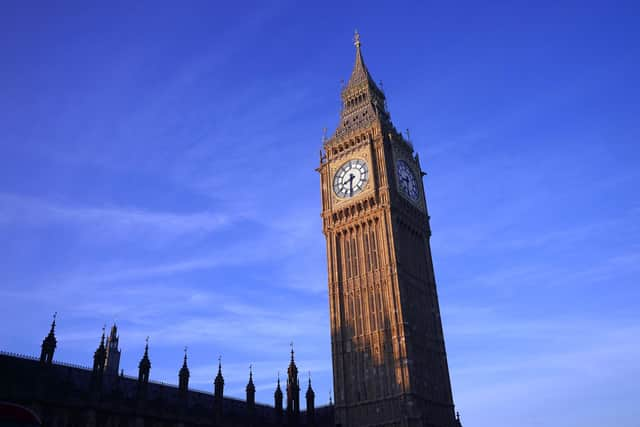The loan charge: Why controversial tax policy has been dubbed 'next Post Office Horizon scandal' by MPs
DUP MP Sammy Wilson said there are “frightening parallels” between the loan charge and the Horizon IT scandal, which saw more than 700 Post Office branch managers handed criminal convictions after faulty Fujitsu accounting software made it appear as though money was missing.
Here’s an explainer to tell you more about the loan charge and its troubled history:
Advertisement
Hide AdAdvertisement
Hide AdWhat is the loan charge? The loan charge, announced by the Government in 2016, was designed to tackle tax avoidance schemes where individuals receive income in the form of loans that are not repaid to avoid income tax. In 2019, there was an outcry when thousands of people on modest incomes faced life-changing, unexpected tax bills. MPs uncovered evidence which revealed that, in the vast majority of cases, people facing the loan charge had simply acted on professional advice or had been told they must sign up to these schemes in order to get paid. They had not set out to avoid paying what was due to HMRC, according to the MPs. A number of suicides were also reported to the Loan Charge All Party Parliamentary Group, which called on the Government to implement a review of the controversial policy.


What happened? Sir Amyas Morse, former Comptroller and Auditor General and Chief Executive of the National Audit Office, was commissioned to undertake a review into the loan charge in September 2019 by the then Chancellor Sajid Javid, following a long-running campaign from MPs and affected individuals. At that time, HMRC estimated that 50,000 individuals, and a further 10,000 employers, were directly impacted by the loan charge.
While the review acknowledged that there was “a clear public interest in preventing the use of loan schemes to avoid tax and in maintaining the principle of taxpayers being responsible for their tax affairs”, it concluded that the loan charge went too far – overriding taxpayers’ statutory protections by applying an unprecedented 20 year look back period and failing to adequately consider the serious distress it would cause some of those affected.
The review also identified failings in the approach HMRC took to enforcing the policy, which in some cases, fell short of the standards the public has a right to expect; particularly in cases where life changing sums of money are at stake.
Advertisement
Hide AdAdvertisement
Hide AdSir Amyas Morse, who conducted the review, said in 2019: “The foundation of our tax system is fairness and where this is undermined through avoidance schemes it is right that these are tackled. However, in doing so, the Government and HMRC must act proportionately and responsibly. As my review makes clear, the design and delivery of the loan charge didn’t get the balance right between tackling tax avoidance and protecting the rights of taxpayers and, in some cases, has caused serious distress to the individuals affected.


“I’m pleased to see Government commit to act on the recommendations of my review, bringing the loan charge back into line with the wider tax system, better protecting those who are least able to repay and providing certainty for all those affected”
HMRC data and reports by the Loan Charge All Party Parliamentary Group (APPG) indicated that many of those affected work as project management or IT contractors, with individuals working through agencies, such as medical professionals, also affected.
HMRC data, released at the time of the review, indicated that more than 70 per cent of scheme users who exclusively used schemes from the start of the 2011/12 tax year onwards, and so would remain in scope of the loan charge after implementation of the review’s proposals, earned less than £50,000 a year in 2017-18, with 42 per cent below £30,000.
Advertisement
Hide AdAdvertisement
Hide AdWhat were the recommendations of the review?: To address these issues, Sir Amyas recommended a package of reforms to both the design and implementation of the loan charge, which included ending the unprecedented 20 year look back period.


The statement to accompany the review’s findings stated: “The loan charge should not apply to loans made before December 9 2010, reflecting the earliest point at which the legal position on loan schemes was made clear and bringing the look back period into line with other UK tax policy. It should continue to apply to loans entered in to from December 9 2010 onwards to recoup tax that is due.”
The review also recommended that the loan charge should no longer automatically tax multiple years’ income as a single lump sum and should instead offer taxpayers an opportunity to split their liability over three tax years. This would help avoid unfairly pushing individuals into the higher tax bracket where the income they received does not merit it, the review said.
The review recommended that HMRC should ensure that repayment terms were manageable for people paying the loan charge and action should be taken to protect the most vulnerable.
Advertisement
Hide AdAdvertisement
Hide AdThe review found that despite the announcement of the loan charge in 2016, unscrupulous advisors and employers had continued to promote the use of loan schemes, with approximately 8,000 loan schemes being entered into the first half of the current tax year (2019-2020), some 3,000 of these were first time users. To address this, the review said the Government should publish a new strategy for tackling the promoters of tax avoidance.
Heartbreaking evidence of anguish caused by loan charge cannot be ignored - Greg Wright
What happened next? Changes were made to the policy following the Morse review, which reduced its impact, but the Loan Charge and Taxpayer Fairness All Party Parliamentary Group (APPG) is calling on the Government to find a “fair resolution” to the scandal in order to save lives. MPs still believe the policy is flawed and punitive. The Yorkshire Post has received testimony from dozens of victims which provide an insight into the trauma faced by many people due to this controversial policy. Last year, The Yorkshire Post was contacted by a woman who said her husband’s life has been made hell due to the loan charge. According to the woman, her husband has been bombarded with letters and phone calls in connection with the policy.
She added: “This has had a profound effect on my husband's physical and mental health. He has contemplated suicide many times and attempted to take his own life once, thankfully I woke up and found him downstairs before he had the chance to take an overdose. I'm so frightened that I am going to lose my soul mate. My husband is in a very dark place.”
Advertisement
Hide AdAdvertisement
Hide AdLoan charge has 'undeniable link’ with suicides and self harm, say MPs: Greg Wright
What is the latest? DUP MP Sammy Wilson and other MPs tabled a parliamentary motion on the loan charge in January that warned many people are facing “unaffordable demands”, there is the “risk of further suicides” and that a review conducted by Lord Morse was “limited and not genuinely independent” of the Treasury and HMRC. They called on the Government to work with all parties to find a “fair resolution and for a full independent investigation, including into the conduct of HMRC”. MPs supported the non-binding motion, but Treasury minister Nigel Huddleston said he did not believe the case had been made for another review.
Mr Wilson, co-chairman of the all-party parliamentary group (APPG) on the loan charge and taxpayer fairness, said it appeared as if HMRC is going after people who they regard as “easy targets” rather than the promoters of such schemes.
The MP for East Antrim also said the loan charge should be repealed as it is “not fit for purpose”, before saying: “I would ask the minister to grasp this nettle and ensure that we don’t have another Horizon scandal.”
Advertisement
Hide AdAdvertisement
Hide AdConservative MP Greg Smith (Buckingham), another co-chairman of the APPG, said he has been left feeling “profoundly troubled” by “one of the most significant crises faced by British taxpayers” in his living memory.
He said: “The loan charge has and is still haunting thousands of our constituents across the whole country, bringing with it a train of despair and destruction that should weigh heavily upon HMRC and indeed all of us in this House.”
Mr Smith said a “fair settlement” is needed for the victims of the loan charge, adding it must take into account “reality” and understand that people acted in good faith and took professional advice.
Conservative former cabinet minister Sir Jacob Rees-Mogg added it was “right to say that those of us who were here in 2017 should be appalled that this was able to get through without being noticed, without being stopped”.
Advertisement
Hide AdAdvertisement
Hide AdHe said: “We are here to seek redress of grievance from an overmighty executive which abuses its power.”
For Labour, shadow Treasury minister Darren Jones, who praised The Yorkshire Post’s “dogged” coverage of the loan charge, said: “I urge the Government to learn the lessons of other scandals, stop burying their heads in the sand, for the minister to be brave and to do the right thing.”
Earlier this week, Deidre Brock MP became the 267th Parliamentarian to join the APPG.
Commentary: Why Rachel Reeves is right to focus on the innocent victims of the loan charge.
Advertisement
Hide AdAdvertisement
Hide AdWhat is Labour’s position? Thousands of people will have taken heart from Shadow Chancellor Rachel Reeves’ sympathetic response to a caller affected by the loan charge, when she appeared on a major radio show.
Ms Reeves, the MP for Leeds West, told the caller to Iain Dale’s show on LBC: “Who are the real culprits here? It’s the people who mis-sold products and people like you who are the innocent victims in this sort of war of attrition with HMRC now.”
She highlighted the fact that Labour had called on the Government to hold an independent inquiry into the loan charge.
She added: “Let’s put the pressure on the Government to do this now because with a lot of these things, it’s the Government just pushing things into the long grass, and we must encourage them to act because many people like Doug (the caller affected by the loan charge) have waited too long for this fair treatment.” Shadow Treasury minister James Murray, told the Commons last month: “The Government’s approach to the loan charge has become a nightmare for ordinary people across the country who are the victims of mis-selling and who are facing financial ruin. The torment and devastating reality is the clearest possible proof that the Government needs to think again. Those facing the loan charge ordeal cannot bear to hear yet again that the Morse Review is the final word on this matter. So will the minister, today, finally agree to commission a new, truly independent review?”
Advertisement
Hide AdAdvertisement
Hide AdWhy the loan charge would make a harrowing but unforgettable TV drama: Greg Wright
What is the Government’s position? In January, Treasury minister Nigel Huddleston said he did not believe the case had been made for another review.
Mr Huddleston said the schemes were “never legitimate, they were always tax avoidance”, but noted there are “some people who are being deceived and forced into errors that are completely inappropriate”.
He said: “Those are many of the cases we’ve heard today. It’s still important that we keep this principle though that the ultimate responsibility lies with those individuals but the way we go about making sure that tax affairs are straightened is really important, that we make sure we do the right thing.”
Advertisement
Hide AdAdvertisement
Hide AdMr Huddleston said HMRC does seek, where possible, to collect revenue from employers and later told MPs: “I don’t believe the case has been made for another review, I stand ready always to listen but that review (by Lord Morse) stood up well … it was thorough, significant and 19 of the changes were implemented, so a hugely impactful review.”
Mr Huddleston said HMRC has made 10 referrals to the Independent Office for Police Conduct where a person has taken their life, adding HMRC has conducted internal investigations.
He added: “Nine of the 10 investigations have concluded and although no misconduct was found, HMRC is taking forward organisational learning from these matters to further strengthen the support provided in identifying individuals who need extra help.”
An HMRC spokesperson recently said: “Significant changes were made to the loan charge following Lord Morse's independent review in 2019 which reduced its impact.
Advertisement
Hide AdAdvertisement
Hide Ad“We take the wellbeing of all taxpayers very seriously and recognise that large tax liabilities can add significant pressures for some people. Taxpayers are supported by our trained advisers who, where appropriate, also encourage them to contact organisations such as Samaritans or Mind for specialised help.”
“We never forget that there’s a human story behind every unpaid tax bill. No-one is more aware of that than our settlement teams, who have supported more than 20,000 customers to settle their use of disguised remuneration schemes. This has secured more than £3bn for the UK’s essential public services.”
– If you need support, Samaritans can be reached on the free helpline 116 123 or via email at [email protected].
Comment Guidelines
National World encourages reader discussion on our stories. User feedback, insights and back-and-forth exchanges add a rich layer of context to reporting. Please review our Community Guidelines before commenting.